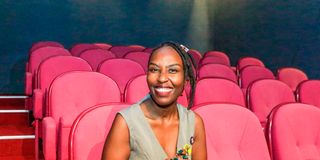A journey of storytelling and self-discovery

What you need to know:
- I enjoy telling stories, but I love consuming them more. I have a projector at home where I watch films, and when I’m stressed, I just immerse myself in cinema.
- I certainly cannot act, but I can coordinate and bring stories to life. Film makes me happy.
- It is a beautiful escape. It teaches you about different cultures and perspectives, and is a communal experience.
Wanjeri Gakuru is a thriving filmmaker in Kenya. With a background in journalism and years of experience in arts and culture, she has embraced filmmaking as a new form of storytelling. Her latest short film is titled Transaction.
How did you discover your passion for storytelling?
I have been a storyteller for as long as I can remember, at least according to my late father. I went to boarding school when I was very young, and I used to write letters to him, complaining about how much I wanted to leave. I also shared stories about my classmates and the adventures we had. It was in boarding school that my storytelling skill developed, even though I did not realise it at the time. I thought I was just complaining and gossiping! Also, I have always loved English and composition.
What did you study in university, did that shape your career?
I went to the University of Nairobi and specialised in print journalism. I intended to focus on arts and culture, and I have worked in that space for the last 13 years. For me, filmmaking was an evolution of storytelling, learning new ways to tell stories. I became a curator and worked with different elements to convey themes and ideas, which eventually led me to film.
What was your first major project?
My first big break was being one of the four writers on a project. It was my introduction to scriptwriting, and it is where I learned the technical aspects, like the structure and software used in writing for film. Later, I joined the writing team for the TV series Country Queen, which became Kenya’s first series on Netflix. Authenticity has always been a common thread in my work. I aim to reflect people as I know them, especially with Transaction, a story I first wrote in 2014 as a short story and then adapted it into a screenplay in 2018. It has been a journey of growth and collaboration.
Transaction...What inspired it, and what is the story about?
It is a story centred around a plus-sized woman on the night of her 25th birthday as she is making a life-altering decision. The title refers to an exchange she is about to make with a sex worker. It is a project I have been developing for years with the help of others. We have held fundraisers and created smaller films to get some practice both in writing and directing. I submitted it to a festival in Berlin, Interfilm, and now we are preparing to showcase it in November.
What motivated you to push for better representation and authenticity in the film industry?
I want to see more material that looks and feels authentic. We do a great job with vernacular content, but a lot of our mainstream media is aspirational. All my projects have an informal character because I want to see our real, everyday selves represented in cinema. Honestly, our stories are interesting, and I want to champion them as much as possible.
How do you come up with ideas?
Ideas come from being present in the world. At one point, I decided to write a script for each room in my house, and I ended up with four fantastic feminist films. The living room script was called Get Laid, a mockumentary. Transaction was for the bedroom, the toilet is a horror and the theme there is consent, the one set in the kitchen is a sci-fi and it’s about boundaries. I have played with different ways of storytelling, and I am learning by doing.
Why focus on storytelling behind the camera instead of acting?
(Laughs) I enjoy telling stories, but I love consuming them more. I have a projector at home where I watch films, and when I’m stressed, I just immerse myself in cinema. I certainly cannot act, but I can coordinate and bring stories to life. Film makes me happy. It is a beautiful escape. It teaches you about different cultures and perspectives, and is a communal experience.
How do you deal with criticism?
I welcome it. Films are subjective, and everyone has their opinions. I make work for a Kenyan audience first, and I hope to retain that focus throughout my career. If someone has an objection to my work, I’d appreciate constructive feedback, even anonymously, but I don’t like hatred without reason.
What else are you involved in?
I participate in literature, curation, and freelance journalism. I have even started an interior design business although it’s still in the early stages. I guess I am always seeking out beauty in different forms.
You look young, how old are you?
(Laughs) I’m 37. I laugh a lot and try to stay happy even when things are not going well. I have a tattoo on my back of dopamine’s chemical symbol because I am all about seeking maximum happiness.
You mentioned losing your parents early in life…
Yes, I am the last-born of four, and unfortunately, we lost our parents when we were still young. The only upside, if I could call it that, is that I have been able to shape my own life. I feel I have my father’s blessing to be a writer, and I’m proud of the path I have chosen.
[email protected]





